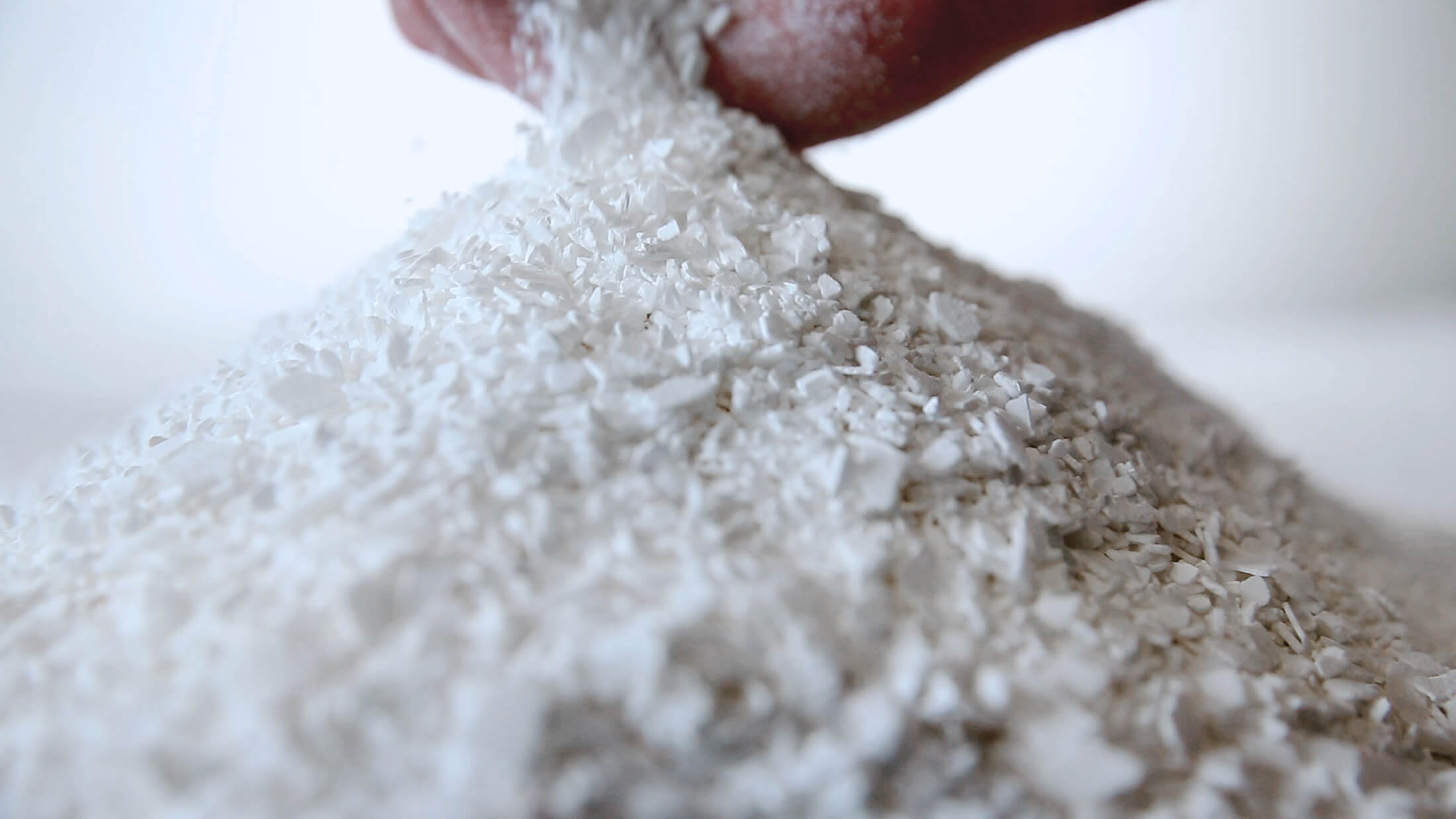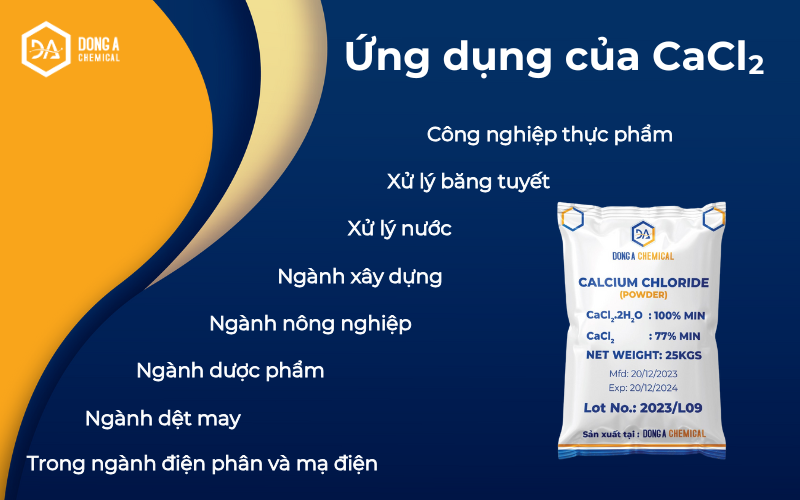Overview of CaCl2
Calcium Chloride (CaCl₂), is an inorganic compound (known as the calcium salt of hydrochloric acid), easily soluble in water and exists in many different forms, including liquid and powder. Liquid Calcium Chloride is widely used due to its solubility, ease of use and safety in many fields. In the form of powder, this compound typically appears as a white, crystalline solid and is produced by the reaction of calcium carbonate (CaCO3) with hydrochloric acid (HCl), or through extraction from seawater or salt lakes. Due to its versatile chemical and physical properties, CaCl2 is considered a key chemical widely employed across numerous industries.
Dong A Chemical’s CaCl2 meets stringent quality standards, ensuring efficient use in various sectors such as water treatment, the food industry, construction, and agriculture. This article will provide a more in-depth look at the properties and applications of this compound.
Physical properties
CaCl2 has several critical physical characteristics that make it useful in various applications. Below are some of the prominent physical properties of calcium chloride:
-
Form: Typically found as a white crystalline solid, it may be in powder or granular form. It can also be dissolved into solutions, commonly ranging from 10% to 45% concentration, depending on the intended use.
-
Solubility: CaCl2 is highly soluble in water, and when dissolved, it undergoes an exothermic reaction, releasing heat and forming a mildly alkaline solution. It is also soluble in some organic solvents such as alcohol and acetone.
-
Melting Point: Approximately 772°C, the temperature at which CaCl2 transitions from solid to liquid form.
-
Density: 2.15 g/cm³
-
Molecular Weight: 110.98 g/mol
-
Boiling Point: Around 1600°C, where CaCl2 changes from liquid to gas.
-
Hygroscopicity: A noteworthy property of CaCl2 is its strong hygroscopic nature. It readily absorbs moisture from the air, eventually dissolving into a liquid form.

Chemical properties
In addition to its unique physical traits, CaCl2 exhibits several significant chemical properties:
-
Reaction with Water: When dissolved in water, CaCl2 forms a mildly alkaline solution. Due to the exothermic nature of the dissolution, the water temperature increases upon dissolution.
-
Reaction with Carbonate Salts: CaCl2 reacts with carbonate salts such as sodium carbonate (Na2CO3) to form calcium carbonate (CaCO3) precipitate and sodium chloride (NaCl). This reaction is frequently applied in water treatment processes to remove water hardness.
-
Reaction with Acids: Under certain conditions, CaCl2 can react with strong acids like sulfuric acid (H2SO4) to produce calcium sulfate (CaSO4) and release hydrochloric acid (HCl).
-
Reaction with Alkaline Earth Metals: CaCl2 can react with other alkaline earth metals like magnesium (Mg) to form new compounds.
-
Exothermic Reaction: Due to its ability to release heat upon hydration, CaCl2 is often employed in applications such as de-icing roads in winter, as the heat generated helps melt ice and snow. It is also utilized in self-heating products like hand warmers.
-
Lowering Freezing Point: CaCl2 significantly lowers the freezing point of water when dissolved, making it ideal for applications such as saltwater cooling systems, which are used in food preservation, air conditioning, and industrial processes requiring low temperatures.
-
Corrosiveness: In concentrated solutions, CaCl2 can corrode certain metals, especially in moist conditions. This property must be considered when handling or storing the compound, as it may lead to corrosion or damage to equipment and infrastructure.
Quality specifications for CaCl2
Dong A Chemical’s CaCl2 is produced to meet strict quality standards, ensuring safety and efficacy for end-users. Below are some key quality indicators of CaCl2:
| No |
Quality Indicator |
Unit |
CaCl2 74% |
CaCl2 94% |
Test Method |
| 1 |
Appearance |
- |
White powder |
Visual Observation |
| 2 |
CaCl2 Content |
% |
> 74% |
> 94% |
ASTM E449-96 |
| 3 |
pH (1% solution in water) |
- |
6:9 |
6:9 |
ASTM D1293-18 |
Applications of CaCl2

Calcium chloride is a versatile chemical used across a wide range of industries and fields:
Food Industry
CaCl2 is used as a hardness regulator in water for beer and other beverages production.
As a food additive (E509), it helps maintain the crispness of canned vegetables and stabilize the structure of dairy products like cheese.
De-Icing
With its moisture absorption and exothermic properties, CaCl2 is commonly employed to melt ice and snow on roads, improving traffic safety in winter.
Water Treatment
CaCl2 is used to adjust water acidity or alkalinity, optimizing the effectiveness of other water treatment chemicals. It quickly achieves desired outcomes in industrial and domestic wastewater treatment.
Construction
In concrete production, CaCl2 accelerates curing by speeding up hydration, thus reducing project timelines without compromising quality, especially in projects with tight schedules.
Agriculture
CaCl2 is utilized as a calcium supplement for soil, helping to improve fruit firmness and prolong the shelf life of agricultural products after harvest.
Pharmaceuticals
CaCl2 serves as a drying agent in helping to separate water from organic solvents, ensuring product purity. It is also used in the synthesis of active pharmaceutical ingredients (APIs) and acts as a stabilizer in some pharmaceutical product formulations.
Textile Industry
In the textile industry, especially dyeing and printing, CaCl2 improves color fastness and enhances dye absorption on fabric fibers. It also prevents color fading during washing or sun exposure.
Electroplating and Electrolysis
CaCl2 plays a vital role in metal processing, especially in electroplating and electrolysis applications. It facilitates ion movement and conducts electricity during the process, ensuring efficient electrochemical reactions and adding aesthetic value to metal products.
Safety precautions
To ensure safety during use, observe the following guidelines:
-
Avoid Inhalation of CaCl2 Dust: The dust may irritate respiratory passages, so wearing masks and protective gear is essential.
-
Protect Skin and Eyes: Due to its strong moisture absorption, CaCl2 may cause skin dryness or irritation. Gloves and protective eyewear should be worn when handling the chemical.
-
Not for Direct use: Though CaCl2 can be used as a food additive, industrial-grade CaCl2 is not safe for direct consumption.
Storage and incident management
To maintain product quality and handle any incidents appropriately, consider the following:
-
Storage:
Store CaCl2 in a dry, well-ventilated place, away from direct sunlight and humidity to prevent caking.
Ensure packaging is sealed tightly in moisture-resistant bags to preserve product quality.
-
Incident Management:
In the event of spills, sweep up and collect CaCl2 for reuse or proper disposal. Avoid letting the dust come into contact with your eyes or nose.
For skin or eye contact: Rinse immediately with plenty of water. Seek medical attention if irritation persists.
For inhalation: Move to fresh air and rest. If breathing difficulties arise, seek immediate medical assistance.
Where to buy quality CaCl2 at the best price?
Dong A Chemical’s CaCl2 ensures consistent quality and is manufactured according to stringent processes, catering to the diverse needs of industries such as water treatment, food, and construction. Contact Dong A today for detailed consultation and to receive the best pricing, avoiding counterfeit products!
